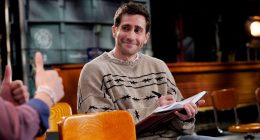
Crime has never not made for popular TV viewing, but in recent years especially, it’s been covered in every which way. There are shows revisiting famous transgressions from more enlightened perspectives, or more playful ones. There are procedurals centering on cops, and limited series delving into the psychologies of the perpetrators. There are crime dramas that double as character studies, as cultural critiques, as meta examinations of the genre itself.
In that landscape, a new one needs something to make itself stand out, be it vivid style, unforgettable performances, a burning sense of purpose or at least an irresistible gimmick. Fox’s anthology series Accused, despite its promising pedigree (it was developed by Howard Gordon of Homeland and 24, and based on an award-winning BBC series by Jimmy McGovern), never manages to find it. The five episodes sent to critics, of a 15-episode season, aren’t so much awful as vaguely dissatisfying — a collection of bite-sized morsels posing as a full meal.
Accused
The Bottom Line A mixed bag.
Accused is built not around a single plot or location or cast of characters, but around a uniform structure. Each standalone episode, brought to life by a different team of writers, directors, and actors, opens with a trial. What the charges are will only gradually be revealed, often after a few red herrings. Instead, the bulk of the hour is taken up by flashbacks tracing how, precisely, the defendant got where they are — the actions they took and the circumstances and motivations that drove them — before closing on a verdict.
With that organizing principle at its center, the obvious question becomes what Accused hopes to accomplish with it. But it’s here that things grow muddled. The problem isn’t that its goals seem to shift from chapter to chapter, though they do: Some episodes, like the harrowing Gordon-penned premiere “Scott’s Story,” raise the implicit question of what anyone might have done in its lead’s shoes, while others build toward more straightforward notes of tragedy or triumph. It’s that Accused lacks the conviction to go very far in any direction, and thus ends up a show about the criminal justice system that has curiously little to say about it.
The series works best when it allows its scope to stretch beyond the facts of the case at hand. “Ava’s Story” uses its plotline, about a Deaf surrogate (Stephanie Nogueras) trying to protect a Deaf baby from surgical intervention, to raise broader issues about the way Deaf people are treated in hearing society, and the rights of parents over the bodies of children too young to advocate for themselves. Director Marlee Matlin lends firsthand insight into the fears and frustrations of her title character, with graceful touches — like the brief cutting out of sound, or the use of subtitles throughout for both spoken English and ASL — to draw us closer to her experiences.
Meanwhile, “Robyn’s Story,” about a drag queen (J. Harrison Ghee) who falls in love with a closeted man (Chris Coy), benefits from an interest in its protagonist that goes beyond the specific events that have landed him in court. Director Billy Porter and writer Daniel Pearle allow its central relationship to grow organically, so that by the time the inevitable curveball comes, we’re emotionally invested enough to wince along with Robyn.
But much of Accused feels less like the stories of flesh-and-blood humans, and more like thought exercises acted out by puppets to prove a point, usually about one hot topic or another — school shootings, the opioid epidemic, etc. The visual style is uninspired, the scripts tend toward bluntness, and even veteran performers like Michael Chiklis or Wendell Pierce can only do so much to bring them to life.
The framing of the stories, as counterpoints to the damning narratives promoted by the prosecution, tends to reduce its participants to the worst moments of their lives. “Kendall’s Story,” about a father (Malcolm-Jamal Warner) out for vengeance against the stranger who molested his young daughter, turns on the relationship between Kendall and his longtime best friends (Donald Paul and Kobna Holdbrook-Smith). Yet its impact is blunted because we’ve barely gotten a feel for what this bond is before it’s being put to the test.
The show’s focus on the defendants’ perspectives slips too easily into reflexive sympathy, as if understanding why someone did what they did is the same thing as excusing them for having done it. The unwillingness of “Scott’s Story” to do that is one of its strengths — all the way up to its uncomfortable final minutes, it tries to reckon with the unthinkable cost of a choice faced by a father (Chiklis) who believes his kid (Oakes Fegley) might be plotting to harm his classmates. But “Billy’s Story,” a bittersweet tale about an aging rock star (Keith Carradine) trying to help his adult son (Evan Gamble) with his severe drug addiction, leaves an unintentional sour tang with an ending that makes too-neat work of an impossible situation.
Indeed, endings in general pose a difficulty for Accused, even in its better episodes: They tend to be anticlimactic, or overly tidy, or both. Although the show’s framing devices are set in courtrooms across America, it is not a legal drama per se. There’s little in the way of strategic maneuvering or rat-a-tat banter — just questions written to set up more flashbacks, occasionally capped off by a rousing, theme-summarizing testimony. But after most of an hour spent insisting these tales are far more complicated than any simple “guilty” or “innocent” verdict could possibly convey, perhaps there’s simply no satisfying way to wrap them up with a bang of the gavel.
So what, then, are we meant to do with Accused? What is the point of a crime drama that’s eager to let us know there’s more to the story than simple guilt or innocence, but stops short of taking to task a system unable to consider people through any other lens? Its insistence on the humanity of flawed characters in miserable circumstances is admirable, broadly speaking, and there are worse things for a show to do than ask us to see them as individuals rather than possible suspects. But without much insight to share, catharsis to offer or even a particularly interesting tone or style to grab us, Accused becomes just another so-so crime drama in an ocean teeming with them.
Source: Hollywood





